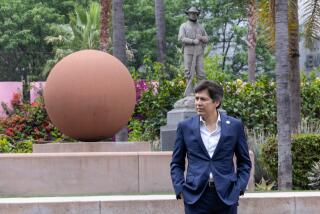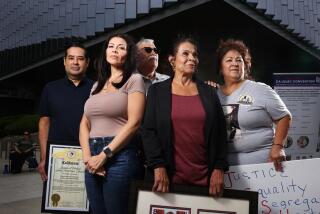Finally, Sacrifice Properly Honored
- Share via
WASHINGTON — It was just a small mistake--one wrong vowel in a young man’s name, an “i” where an “a” should have been. It was not worth fixing.
Over the years, that’s what the government told Carmen Rocha about the misspelling of her son Bobby’s name on the Vietnam Veterans Memorial wall in Washington. Instead of Robert Salas Rocha, his name was inscribed as Robert Silas Rocha.
But to Carmen Rocha, the misspelling was evidence that her country had forgotten her son, just 19 when he died with three buddies on reconnaissance in November 1970 on a Vietnamese trail. With his name misspelled--Carmen’s family name--it was as though Bobby wasn’t on the wall at all.
Until this weekend, that is, when the 70-year-old retired Los Angeles waitress saw with her own eyes--on the long black wall that chronicles the 58,000 dead from the Vietnam War--that Bobby’s name at last was recorded correctly. Six days ago, in answer to a family request first made in the 1980s and twice denied, an engraver corrected the spelling.
On Monday, Carmen and five family members were guests of the government in the VIP section for the annual Memorial Day ceremony at the wall.
They listened as former Sen. Bob Dole referred to “this sacred place of reflection” and said it is the veterans’ “sacrifice, service and blood that sanctifies this wall.”
“I’m so glad I came today instead of before,” Carmen said softly after Dole spoke, referring to her first visit to the nation’s capital. “I wouldn’t have wanted to come with Bobby’s name wrong.”
Before the ceremony, Rocha family members placed a large poster in front of the panel bearing Bobby’s name. It included photos of him and their written memorials. “Dear Bobby, You will be in my heart from here to eternity,” Carmen wrote.
On the wall, Bobby’s name was still fresh, the engraving newly carved, standing out against the other, long-inscribed, names around it. It is on Panel 5 West, Line 127.
Carmen approached it Sunday in her wheelchair with her son Rudy pushing her forward. Seeing it for the first time, she at first sat stoically, sweating under the early afternoon sun but showing no outward emotion. She held a bouquet of irises and gave them to her 13-year-old grandson, Nicolas, to lay before Bobby’s name.
Then she rose to touch the engraving. Forcing her bad knees to lift her out of the wheelchair, she traced a line with her finger from the panel that had Bobby’s misspelled name to the adjacent panel with the name properly spelled.
“I think it’s good the government decided to fix it,” she said. “If someone died for their country, he should at least have his name spelled correctly.”
The family first learned of the misspelling in the 1980s, and then only when someone saw it on the scaled-down mobile wall that tours the country. An appeal to the government then and another in the early 1990s failed. Both times, officials responded by noting that they only correct “gross misspellings” in the names on the wall.
Last year, Orange County attorney Tom Umberg--a Vietnam War vet and colonel in the Army Reserves--saw Bobby’s dog tag in the Los Alamitos Army Reserve office of Rosie Rocha, Bobby’s sister and an Army master sergeant. She told Umberg the story, and he began behind-the-scenes arm-twisting in Washington.
“This was a mistake that couldn’t stand,” Umberg said last week in his Irvine office. “I’m happy the U.S. government, albeit way too late, finally properly honored the sacrifice made by the Salas Rocha family.”
Alan Greilsamer, spokesman for the Vietnam Memorial Fund that paid for the change, said, “It was one of those things where it wasn’t a gross misspelling, but it was appropriate to make the change.”
Back in her hotel Sunday after the first visit to the wall, Carmen revealed a secret: “You don’t know how hard I prayed this morning that I would not break down.”
She also prayed that Rudy, now 53 and Bobby’s older brother, would find peace after seeing the wall. Thinking that Rudy still harbored some older-brother guilt for Bobby volunteering to follow him to Vietnam, Carmen said, “I didn’t want him to see me cry. I prayed to God not to have an emotional reaction.”
Rudy, a Los Angeles mail carrier, smiled at his mother’s concern. “I’ve had 31 years to think about things,” he said. “I’m OK now.”
Still, it was a weekend replete with memories. Carmen recalled Bobby telling her not to worry about him. Before he left for Vietnam, he laid out a row of several matchsticks, then a second row with only one match. “This is destiny, and this is me,” he told her, pointing to the two rows. “If God wants me to cross over, I will.”
The teeming crowds at the wall and the uncomfortable heat on Sunday had made it difficult to secure a private moment, Carmen said. Sometime later, she said after her visit, “I will take time to talk to Bobby.”
In the meantime, Carmen said she believes Bobby would be proud of the family’s effort to challenge the bureaucracy--and of the eventual correcting of his name. She hoped the weekend might close another chapter in the family’s effort to make peace with his death.
“It’s not like it’s ever going to have an ending,” Carmen said. “Bobby’s around here somewhere.”
With a smile, she added: “He can take the heat better than me.”


